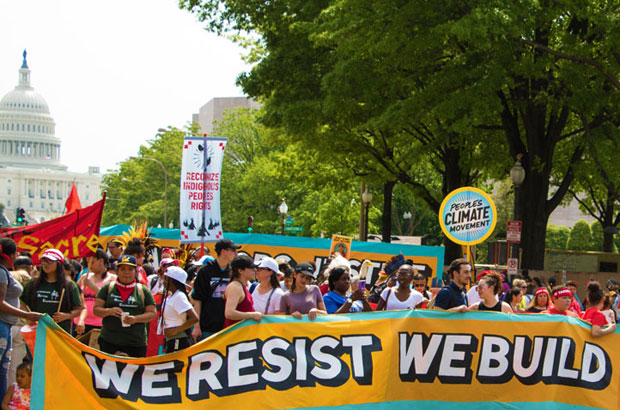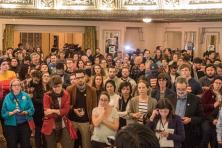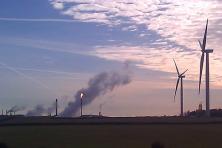Of the 200,000 people who came to the People’s Climate March in DC last Saturday, I got to thank maybe 300 personally. I spent much of the day overcome with gratitude. This will have to do as my thanks to the other 199,700, and the over 100,000 others who marched in over 370 places around the country and the world.
I often get thanked for working on climate change, and I never know quite know what to do with it. One always likes to be appreciated, but truth be told, it freaks me out. Let me cry on your shoulder about this for a minute, so I can explain why I’m so grateful to the marchers.
If you work a lot on climate, you know how awkward it can be to explain what you do or carry the weight of it among your friends and family. As someone who does it for a living, I’ve tried a lot of angles and evasions to avert the psychological door-slamming effect of talking about climate. One hesitates to be personally associated with the fear and fatalism the topic evokes. But now, I mostly just walk right into it chin first: “I work on solutions to climate change.”
Usually there’s a pause, tinged by some sort of reaction to the idea that a person would presume so much – that there even are solutions and that someone takes it as their job to effectuate them. It’s like they’re shaking hands with Don Quixote.
But worse than the incredulity is the guilt. Just saying what we do makes people squirm, because it pokes their denial. The vast majority of people are not climate science deniers per se, but we’re ALL in some form climate denial – some kind of psychological accommodation that allows us to put one foot in front of the other when we’re clearly on a path that leads over a cliff. By naming our work, we challenge that. Not too many people turn around and walk away, but many seem to wish they could. Some feel compelled to explain why they had to drive a car that day, as if we might issue a carbon citation.
So people who work on climate carry a lot of fear and shame – their own, and some of the ambient guilt of people who come to associate them with this overwhelming threat we all create. We humans (especially humans of privilege) spend a great deal of psychic energy trying to find some darkness to put the climate crisis in, someplace out of the center of our consciousness, where the glare of existential horror and our own complicity isn’t quite so harsh. Shining a light into those dark corners can be thankless work.
Yet, when I tell people what I do, they often thank me. And that feels good for a minute. But then I worry that gratitude is a palliative, a bit of refuge in the thought that somebody’s trying to deal with it. I’m glad to have offered some solace but part of me is thinking NO NO NO please don’t thank me if that in any way makes you think we have the situation even remotely in hand, or that we don’t ALL need to show up much bigger and bolder than we are.1
But I don’t say that. I ask about what they do. In my bubble, most people I know and meet are socially and politically engaged, active citizens and community-members, generous, woke. They work and volunteer in education, health, social and economic and racial justice, progressive businesses – things I care about a lot. And we’re social beings. So I thank and genuinely appreciate them and their work. We extend to each other the small comfort of knowing good people doing their respective and mutually appreciated good things. But inside I’m going Ack! Wait! We need you; this isn’t just an issue it’s an existential fucking emergency and we can deal with it if we all rise up, but if you let the “climate people” take care of it we’re toast. Saying this would make me even more socially toxic. Choking it back drives me nuts.
Which is one reason why a big climate march is so sanity-making. Yes it’s inspiring and energizing, but it’s also an immense relief. As far as I could see, for a whole day, I was surrounded by people I didn’t know. Most of them had signs, and everyone had a story: setbacks and breakthroughs – pipeline fights, clean energy projects, divestment campaigns, struggles to protect their lungs and lives and kids and water and cultures and communities. In isolation, most of those stories would be sad and futile. Few of them would seem relevant at the scale of the problem. But together, they are a tide, rising.
Check out the pics from the march. The energy of this movement is new, forward-looking, inclusive, democratic and increasingly irresistible. It’s a stark contrast to the energy of our fossil-fueled opposition: old, backward-looking, exclusive, authoritarian, and increasingly abhorrent. (That’s why they have to spend ever more bajillions on ads projecting the contrary.) Days like Saturday sharpen that contrast, making it easier to see and believe in the growing evidence that the fossil fuel empire is entering terminal decline, that its entrenched political power is residual, finite.
Marching along, signs and spirits high, it even becomes possible to imagine that the tide might turn fast enough to save a decent future. You can glimpse – with the vision of 400,000 diverse eyes – how the transition might renew community, advance justice, enhance economic security, rebuild democracy. Too many days, we can’t help but feel we are alone with these possibilities and the necessity of reaching toward them. In our isolation and fear, we wonder whether they’re real. But not last Saturday, and -with the immense collective energy of the marches fresh in our hearts - not any day soon.
How can we capture and wield this strength and solidarity and possibility? How can we imagine our destination and forge our paths in ways that multiply that strength instead of dividing and squandering it? How might we project that power in our broader communities, transforming guilt into determination, fear into urgency, fatalism into hope-in-action? Saturday, we invited each other to that conversation in a new way, as if we intend to settle for nothing less than winning answers. We lifted some of the weight of shame and isolation and filled each other with the renewable power of our shared determination.
To be thanked as one person for doing one’s small bit is always appreciated, but never feels quite right or justly deserved in the immense scope of the escalating crisis. Inevitably, it feels a bit like “thanks for trying.” But mutual thanks, to the 300,000th power? That works. That starts to sound true.
1: And while I’m kvetching, PLEASE don’t evince guilt about your lifestyle with me. I’m a guilty slob too, and we get nowhere by blaming ourselves for living our lives in the only energy system there is. Yes, take personal responsibility and live more sustainably. But don’t do it out of penance or shame; do it to regain your power and take back your money; do it with attitude. And also be real: if we don’t take collective responsibility as citizens, confront egregious perpetrators, regain our power, and wage a clean energy revolution, our vegan diets and LED bulbs won’t amount to much. Our sense of complicity and hypocrisy is a huge albatross. I implore you to cast it off or morph it into ferocity. Please read and share Bill McKibben’s “The question I get asked the most.” My own take, with thanks to Naomi Oreskes and Kathleen Dean Moore, is in “We have met the wrong enemy” – written in response to trolls who swarmed around kayaktivists protesting the Polar Pioneer.




